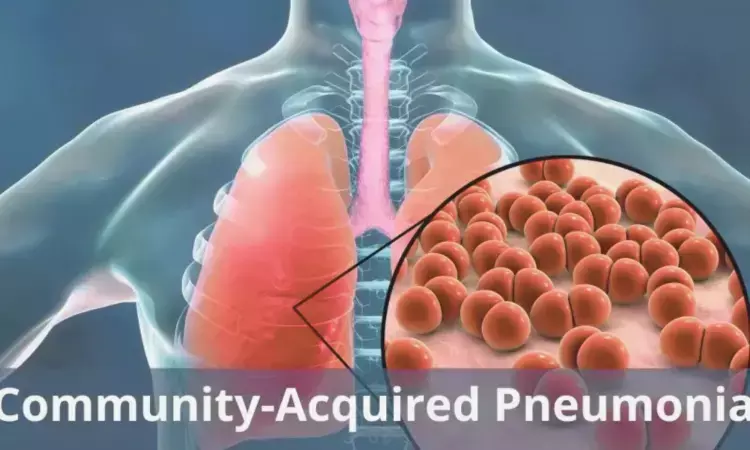- Home
- Medical news & Guidelines
- Anesthesiology
- Cardiology and CTVS
- Critical Care
- Dentistry
- Dermatology
- Diabetes and Endocrinology
- ENT
- Gastroenterology
- Medicine
- Nephrology
- Neurology
- Obstretics-Gynaecology
- Oncology
- Ophthalmology
- Orthopaedics
- Pediatrics-Neonatology
- Psychiatry
- Pulmonology
- Radiology
- Surgery
- Urology
- Laboratory Medicine
- Diet
- Nursing
- Paramedical
- Physiotherapy
- Health news
- Fact Check
- Bone Health Fact Check
- Brain Health Fact Check
- Cancer Related Fact Check
- Child Care Fact Check
- Dental and oral health fact check
- Diabetes and metabolic health fact check
- Diet and Nutrition Fact Check
- Eye and ENT Care Fact Check
- Fitness fact check
- Gut health fact check
- Heart health fact check
- Kidney health fact check
- Medical education fact check
- Men's health fact check
- Respiratory fact check
- Skin and hair care fact check
- Vaccine and Immunization fact check
- Women's health fact check
- AYUSH
- State News
- Andaman and Nicobar Islands
- Andhra Pradesh
- Arunachal Pradesh
- Assam
- Bihar
- Chandigarh
- Chattisgarh
- Dadra and Nagar Haveli
- Daman and Diu
- Delhi
- Goa
- Gujarat
- Haryana
- Himachal Pradesh
- Jammu & Kashmir
- Jharkhand
- Karnataka
- Kerala
- Ladakh
- Lakshadweep
- Madhya Pradesh
- Maharashtra
- Manipur
- Meghalaya
- Mizoram
- Nagaland
- Odisha
- Puducherry
- Punjab
- Rajasthan
- Sikkim
- Tamil Nadu
- Telangana
- Tripura
- Uttar Pradesh
- Uttrakhand
- West Bengal
- Medical Education
- Industry
No Major Advantage Seen With mPCR and Procalcitonin Combo in ICU-Treated Pneumonia: MULTI-CAP Trial

France: A new study has found that using a combination of multiplex PCR (mPCR) testing and serum procalcitonin levels to guide antibiotic management in critically ill patients with community-acquired pneumonia (CAP) did not significantly reduce antibiotic exposure or improve outcomes when compared to standard care. The findings of the MULTI-CAP randomized controlled trial were published on July 15, 2025, in Intensive Care Medicine by Dr. Guillaume Voiriot of Sorbonne Université, Assistance Publique – Hôpitaux de Paris, and his research team.
The trial aimed to assess whether a management approach incorporating rapid, broad-spectrum mPCR testing alongside procalcitonin biomarker guidance could minimize unnecessary antibiotic use in the intensive care unit (ICU) without compromising patient safety.
Conducted across 20 centers, the study enrolled non-immunocompromised adults (aged 18 and above) who were admitted to the ICU with CAP. Participants were randomly assigned to two groups. The intervention group received both conventional microbiological tests and respiratory mPCR testing, with antibiotic decisions guided by an algorithm based on mPCR findings and procalcitonin levels. In contrast, the control group was managed using standard microbiological investigations alone. In both groups, clinicians considered stopping antibiotics beginning on Day 3 and reassessed daily up to Day 7 based on procalcitonin levels and their progression.
Between October 2018 and March 2022, a total of 406 patients were randomized. The final analysis included 385 patients. The analysis revealed the following findings:
- On Day 28, the median number of days patients were alive and free of antibiotics was 19 days in both the intervention and control groups.
- The primary outcome showed no statistically significant difference between the two groups.
- The intervention group had a shorter cumulative duration of antibiotic use by an average of three days compared to the control group.
- The incidence of serious adverse events was similar in both groups, indicating that the intervention did not increase patient harm.
- Despite the reduced antibiotic duration, the strategy did not lead to a meaningful improvement in antibiotic-free survival.
The researchers concluded that while the use of mPCR and procalcitonin-guided algorithms can slightly reduce the total duration of antibiotic exposure, this approach did not translate into better clinical outcomes or significant reductions in antibiotic use over the 28 days. These findings suggest that, although mPCR offers rapid pathogen identification, its integration with procalcitonin monitoring may not yet be sufficient to replace standard decision-making protocols in the ICU for patients with CAP.
The study highlights the need for further research to refine diagnostic and antibiotic stewardship strategies in critical care settings, balancing the benefits of rapid diagnostics with meaningful clinical improvements.
Reference:
Voiriot, G., Argaud, L., Cohen, Y. et al. Combined use of a multiplex PCR and serum procalcitonin to reduce antibiotic exposure in critically ill patients with community-acquired pneumonia: the MULTI-CAP randomized controlled trial. Intensive Care Med (2025). https://doi.org/10.1007/s00134-025-08014-9
Dr Kamal Kant Kohli-MBBS, DTCD- a chest specialist with more than 30 years of practice and a flair for writing clinical articles, Dr Kamal Kant Kohli joined Medical Dialogues as a Chief Editor of Medical News. Besides writing articles, as an editor, he proofreads and verifies all the medical content published on Medical Dialogues including those coming from journals, studies,medical conferences,guidelines etc. Email: drkohli@medicaldialogues.in. Contact no. 011-43720751


